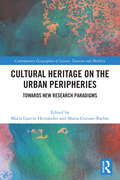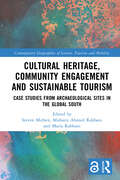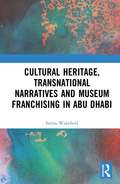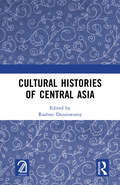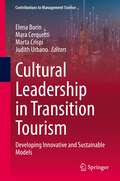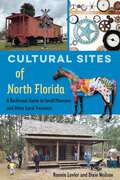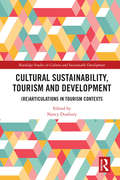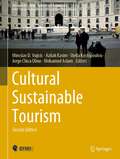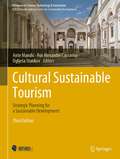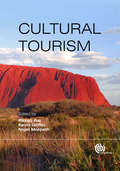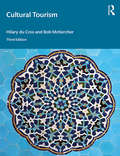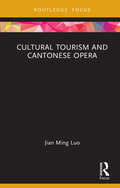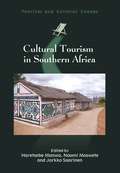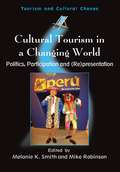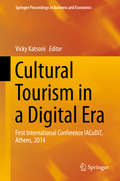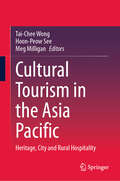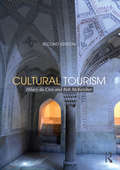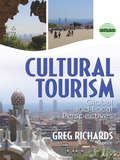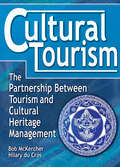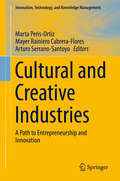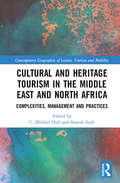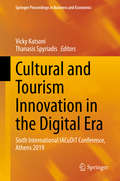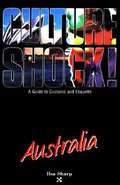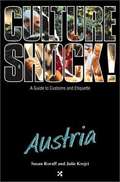- Table View
- List View
Cultural Heritage on the Urban Peripheries: Towards New Research Paradigms (Contemporary Geographies of Leisure, Tourism and Mobility)
by Maria Gravari-Barbas María García-HernándezThis innovative and insightful book critically explores how to recognize and generate the social, cultural, political and economic values of the heritage of urban peripheries and encourage new metropolitan development scenarios that protect and build upon that cultural heritage.Expert-led and richly illustrated throughout, the text addresses issues such as the management and development of the cultural heritage of urban peripheries, community involvement, the relationship of youth with cultural heritage, the heritage of ethnic communities and their cultural identity, tourism development supported by heritage resources and the art-heritage relationship at urban peripheries. It looks at the whole spectrum of heritage of the metropolitan peripheries including architectural heritage (industrial areas, factories and warehouses); transport infrastructure (canals and railways); social housing, and contemporary residential architecture. It also comprises the rich intangible heritages of working-class and/or migrant communities, in process of constant change and reconfiguration through protest, negotiation and cultural expression. This significant volume reveals the heterogeneity of the existing cultural heritage in the urban peripheries, the complexity of the processes of recognition and social appropriation of these assets as well as their need for protection.This is a pivotal resource for students, scholars and academics of urban studies, tourism studies and cultural studies, as well as those with an interest in these topics more generally.
Cultural Heritage, Community Engagement and Sustainable Tourism: Case Studies from Archaeological Sites in the Global South (Contemporary Geographies of Leisure, Tourism and Mobility)
by Steven Mithen Mubariz Ahmed Rabbani Maria RabbaniThis timely and innovative book critically explores how cultural heritage in the Global South can be used to mobilise community engagement and promote sustainable tourism at archaeological sites.Whilst the volume covers theoretical issues, it primarily offers insight into how both small and large projects within low- and middle-income countries start, plan and develop. It describes what factors lead some projects to succeed, some to fail and most to have elements of both. Core to this investigation, each specifically commissioned chapter considers the challenges of developing collaboration and joint ownership between multiple stakeholders, ranging from local communities to national governments. In addition, the book considers how the challenges of the COVID-19 pandemic were managed, with lessons for future events of such magnitude. In summary, this significant volume recognises the value of developing collaborative partnerships between academics, NGOs and local communities, to achieve community engagement within archaeological research and support sustainable development by developing appropriate forms of tourism at archaeological sites. It provides essential reading for those interested in tourism, heritage studies, archaeology, geography, tourism studies and cultural studies.The Open Access version of this book, available at http://www.taylorfrancis.com, has been made available under a Creative Commons [Attribution-Non Commercial-No Derivatives (CC BY-NC-ND)] 4.0 license.
Cultural Heritage, Transnational Narratives and Museum Franchising in Abu Dhabi
by Sarina WakefieldThis publication contributes to new understandings of how heritage operates as a global phenomenon and the transnational heritage discourses that emerge from this process. Taking such a view sees autochthonous and franchised heritage not as separate or opposing elements but as part of the same process of contemporary globalised identity-making, which contributes to the development of newly emergent cosmopolitan identities. The book critically examines the processes that are involved in the franchising of heritage and its cultural effects. It does so by examining the connections and tensions that emerge from combining autochthonous and franchised heritage in the United Arab Emirates, providing a unique window in to the process of creating hybrid heritage in non-Western contexts. It develops new ideas about how this global phenomenon works, how it might be characterised and how it influences and is itself affected by local forms of heritage. By exploring how autochthonous and franchised heritage is produced in Abu Dhabi in the United Arab Emirates it becomes clear that Western-dominated practices are often challenged and, perhaps more importantly, that new ways of understanding, producing and living with heritage are being articulated in these previously marginal locations. The book offers innovative insights into heritage as a transnational process, exploring how it operates within local, national and international identity concerns and debates. It will appeal to scholars and students interested in critical heritage studies, museums, tourism, cultural studies and Middle Eastern studies.
Cultural Histories of Central Asia
by Rashmi DoraiswamyCentral Asia, the 'heart' of the Eurasian landmass, has through the centuries been the hub of diverse and varied cultures. These cultures have encompassed pre-Islamic religions and Islam, sedentary and nomadic lifestyles and lived through rapid transitions from feudal, capitalist and socialist economies, from Tsarist to Soviet and post-Soviet formations. The essays in this volume examine the cultural exchanges and encounters that have occurred in the region through a vast timeline that extends from the premedieval to the medieval and modern periods. The writers are academics, as well as art practitioners and independent researchers who belong to a wide spectrum of disciplines: Central Asian and Russian Studies, Architecture, Ethno-Musicology, History, Painting, Film Studies, Art History, Textiles, Literature and International Relations. The volume presents a colourful mosaic of views on the many cultural histories of Central Asia.
Cultural Leadership in Transition Tourism: Developing Innovative and Sustainable Models (Contributions to Management Science)
by Elena Borin Mara Cerquetti Marta Crispí Judith UrbanoCultural tourism has proved to be a significant source of economic development for cultural destinations, but it has also emerged as a sometimes potentially controversial and unsustainable phenomenon. The recent pandemic has also pointed out that we need different models of development of tourism, that include a more balanced approach to cultural components in cities and rural areas. Calls have been made on the need to design more sustainable models of tourism development for cultural destinations, conceiving tourism as a means to increasing the quality of life and generating economic opportunities in cities and regions by involving their communities and stakeholders. This book presents an in-depth analysis of the transition towards more sustainable models of cultural tourism development. Starting from the ongoing debate on cultural ecosystems, the book explores the potential key role of cultural and creative organizations as leaders of change. Including theoretical contributions, quantitative and qualitative analyses and international case studies, the book explores the role of cultural actors as leaders and their potential as drivers of culture-led innovation for tourism in cities and regions.
Cultural Sites of North Florida: A Backroads Guide to Small Museums and Other Local Treasures
by Ronnie Lovler Dixie NeilsonDiscover local history through less-traveled places that reflect the stories and communities of the region Cultural Sites of North Florida is your guide to 43 intriguing, little-known destinations in the northern part of the Florida peninsula, from Crystal River to Jacksonville. In this book, local experts Ronnie Lovler and Dixie Neilson highlight places that can be reached by a short trip away from the highways and down meandering backroads, inviting you to discover forgotten history, immerse yourself in the stories of diverse communities, and learn what makes this area of the state unique.This book features a selection of small museums, culturally significant sites, nature centers, and parks that many tourists and residents may have never explored. Locations include the Florida Thoroughbred Breeders & Owners Association in Ocala, Morningside Nature Center in Gainesville, Camp Blanding Museum and Memorial Park in Starke, the springs of Gilchrist County, Florida Agricultural Legacy Learning Center near St. Augustine, the A. L. Lewis Museum at American Beach, and many more.For each place, Lovler and Neilson describe what can be found there, the story behind the site, and the importance of the site to the people in the community. Whether you enjoy this book from your favorite cozy armchair or by hitting the road to see these hidden gems for yourself, you will be rewarded with a deeper understanding of the past and present of nearby towns and neighborhoods. And you will be inspired to keep exploring on your own as this book shows there is so much more to investigate!
Cultural Sustainability, Tourism and Development: (Re)articulations in Tourism Contexts (Routledge Studies in Culture and Sustainable Development)
by Nancy DuxburyCultural Sustainability, Tourism and Development considers how tourism provides a lens to examine issues of cultural sustainability and change. It discusses how cultural and natural assets, artistic interventions, place identity, policy strategies, and community well-being are intertwined in (re)articulations of place and local dynamics that occur in tourist locations. With a primary focus on culture in sustainable development, the book clarifies connections between culture as a core dimension of local sustainability and cultural dimensions of sustainable tourism. It highlights the roles and place of cultural expression, artistic activity, and heritage resources in local or regional sustainable development contexts. Chapters critically examine the dimensions of tourism-invoked dynamics of change and the cultural impacts of tourism-related activities. The book concludes with proposals for new culture-informed and creativity-based approaches, mediations, and relations to encourage a better balance between visitors and residents’ quality of life and the broader sustainability of the area. Interdisciplinary and international in scope, contributions reflect on communities and rural areas located in Brazil, Canada, Croatia, India, Italy, Japan, the Netherlands, Poland, Portugal, and the United States. This book will be of great interest to students and scholars of cultural development and policy, heritage studies, cultural tourism and sustainable tourism, cultural geography, and regional development.
Cultural Sustainable Tourism (Advances in Science, Technology & Innovation)
by Azilah Kasim Stella Kostopoulou Mohamed Aslam Miroslav D. Vujicic Jorge Chica OlmoThis book is an assemblage of diverse yet homogenous research papers that bring together the issues and challenges of cultural heritage conservation and tourism sustainability. The richness of this book stems from its inclusion of diverse case studies from around the globe while scrutinizing the cases of both deterioration and sustainability of cultural heritage belonging to different eras.This book sheds light on the connections between culture as an essential dimension of local sustainability and cultural dimensions of sustainable tourism, further contributing to the complex discussion between culture and tourism. This book gives an overview of current research and subjects of discussion that focuses on cultural sustainable tourism through several sections, such as planning and management of sustainable tourism, sustainable cultural tourism development in a digital era, social and economic impacts of cultural tourism, and sustainable tourism development in urban areas
Cultural Sustainable Tourism: Strategic Planning for a Sustainable Development (Advances in Science, Technology & Innovation)
by Uglješa Stankov Ante Mandić Rui Alexandre CastanhoThis book discusses the the integration between tourism and heritage and strategies to achieve sustainability in the tourism sector. The book adds innovative insights into the development of new practices solving challenges of sustainability in this sector and promoting responsible tourism. The book in hands also offers solutions and discusses sustainable tourism environment, social and economic impacts of tourism, and policies and mechanisms for heritage preservation. The primary audience of this book will be scholars, planners, architects, and stakeholders interested in sustainable tourism. This book is a culmination of selected research papers from IEREK’s third edition of the International Conference on Cultural Sustainable Tourism (CST) held online in collaboration with the University of Maya, Portugal (2021).
Cultural Tourism
by Razaq Raj Ian Rotherham Nigel Morpeth Carlos Fernandes Dr Dolors Vidal Tahir Rashid Vincent Zamitt Kevin Griffin Jane Legget Jon Edwards Claudia Kroesbacher Frances Mcgettigan Alexandra Tirca Wided Majdoub Kelli Ann Malone Ivana Pavlic Manon Niesten Anna Thompson Lia Bassa Catherine Gorman Neus Crous-CostaWith contributions from international experts this book provides a broad discussion of cultural tourism as a concept and the way it is implemented in diverse regions around the world. Addressing the notion of cultural tourism and what it means to tourism as an industry, and also types of cultural tourism offered to tourists and experienced by them. Many international case studies will be included on specific instances of cultural tourism, and current topics such as cultural tourism's relationship to sustainability are discussed.
Cultural Tourism
by Ian Rotherham Carlos Fernandes Tahir Rashid Vincent Zamitt Jane Legget Jon Edwards Claudia Kroesbacher Alexandra Tirca Wided Majdoub Kelli Ann Malone Ivana Pavlic Manon Niesten Anna Thompson Lia Bassa Catherine Gorman Neus Crous-Costa Dr Dolors Vidal-Casellas Frances McGettiganWith contributions from international experts this book provides a broad discussion of cultural tourism as a concept and the way it is implemented in diverse regions around the world. Addressing the notion of cultural tourism and what it means to tourism as an industry, and also types of cultural tourism offered to tourists and experienced by them. Many international case studies will be included on specific instances of cultural tourism, and current topics such as cultural tourism's relationship to sustainability are discussed.
Cultural Tourism
by Bob McKercher Hilary du CrosCultural Tourism remains the only book to bridge the gap between cultural tourism and cultural and heritage management. The first edition illustrated how heritage and tourism goals can be integrated in a management and marketing framework to produce sustainable cultural tourism. The current edition takes this further to base the discussion of cultural tourism in the theory and practice of cultural and heritage management (CM and CHM), under the understanding that for tourism to thrive, a balanced approach to the resource base it uses must be maintained. An ‘umbrella approach’ to cultural tourism represents a unique feature of the book, proposing solutions to achieve an optimal outcome for all sectors. Reflecting the many important developments in the field this new edition has been completely revised and updated in the following ways: New content on increasingly relevant topics including sustainability, climate change, the threat of de-globalization, overtourism and social media. New sections on experience creation, accessibility and inclusivity, as well as expanded material on creative industries and new management challenges. New international case studies and tried-and-tested assignment exercises have been added to every chapter. Written by experts in both tourism and cultural heritage management, this book will enable professionals and students to gain a better understanding of their own and each other’s roles in achieving sustainable cultural tourism. It provides a blueprint for producing top-quality, long-term cultural tourism products.
Cultural Tourism and Cantonese Opera (Routledge Cultural Heritage and Tourism Series)
by Jian Ming LuoCultural tourism is an experiential tourism based on searching for and participating in new and deep cultural experiences. This book enhances the tourism literature by testing the tourist attitude toward related issues of Cantonese Opera as a cultural product of the Greater Bay Area. This book starts with a general introduction to the background of Cantonese Opera. Chapter 2 is a historical review of Cantonese Opera development in the GBA. Chapter 3 introduces the concept of the Cantonese Opera as a cultural product. Chapter 4 discusses the related Cantonese Opera on tourism development in the GBA. Chapter 5 describes the trends of modernisation and integration of Cantonese Opera in the GBA. Lastly, Chapter 6 is a case study in Macau. This book focuses on Cantonese Opera and cultural tourism. This means tourism practitioners and arts administrators should be the primary source of market and while people in the rest of the world who are interested in Cantonese Opera and cultural tourism should find this book useful. This book is a valuable resource not only for social science researchers, but also for those in related fields, for example, arts administrators and tourism officers, among many others. This book could serve as a text for an advanced level undergraduate course for students in many of the arts administration and tourism fields. Additionally, this book is a valuable resource for teaching graduate students not only in tourism, but also in related fields. Furthermore, government or practitioners can improve the management of city and tourism service using this book.
Cultural Tourism in Southern Africa
by Haretsebe Manwa Naomi MosweteThis volume provides an accessible overview of cultural tourism in southern Africa. It examines the utilisation of culture in southern African tourism and the related impacts, possibilities and challenges from deep and wide-ranging perspectives. The chapters use case studies to showcase some of the cultural tourism which occurs in the region and link to concepts such as authenticity, commodification, the tourist gaze and 'Otherness', heritage, sustainability and sustainable livelihoods. The authors scrutinise both positive and negative impacts of cultural tourism throughout the book and explore issues including the definition of community, ethical considerations, empowerment, gender, participation and inequality. The book will be a useful resource for students and researchers of tourism, geography, anthropology and cultural studies.
Cultural Tourism in a Changing World
by Melanie K. Smith Mike RobinsonCultural Tourism in a Changing World provides an in-depth analysis of the key political and social debates in the field of cultural tourism, drawing on a range of international examples to exemplify the issues raised. The authors highlight the complex dynamism of cultural tourism and its potential to transform destinations and peoples in a rapidly changing world.
Cultural Tourism in a Digital Era: First International Conference IACuDiT, Athens, 2014 (Springer Proceedings in Business and Economics)
by Vicky KatsoniThis book covers the entire spectrum of cultural and digital tourism and presents the latest findings, examples and cases, highlighting innovations for the tourism industry from both an academic and a practical point of view. The book invites readers to discover ongoing developments and recent trends in fields like heritage and museum management; sports tourism; tourism economics and policy; e-marketing and e-business; and many other fields, making it of value to researchers in tourism management, practitioners and policymakers alike. The book was edited in collaboration with the International Association of Cultural and Digital Tourism - IACuDiT - and includes the proceedings of the First International Conference on Cultural and Digital Tourism.
Cultural Tourism in the Asia Pacific: Heritage, City and Rural Hospitality
by Tai-Chee Wong Hoon-Peow See Meg MilliganThis book covers multiple cultural tourism aspects including among others, nature and rural conservation policy and conflicts, reflected in case studies, and ethnic minority heritage and their folklore traditions and performances, as well as tourism activities in the city areas. It provides a distinguished quality and an innovative focus to the existing literature by highlighting the unique features and development experience in cultural tourism in the Asia Pacific in both the rural and urban setting. The book has a strong appeal to an international audience, including both tertiary institution academics and students, seeking a better understanding of public policy and cultural tourism practices in the contemporary world.
Cultural Tourism, 2nd Edition: The Partnership Between Tourism And Cultural Heritage Management
by Hilary Du Cros Bob MckercherCultural Tourism remains the only book to bridge the gap between cultural tourism and cultural and heritage management. The first edition illustrated how heritage and tourism goals can be integrated in a management and marketing framework to produce sustainable cultural tourism. The current edition takes this further to base the discussion of cultural tourism in the theory and practice of cultural and heritage management (CM and CHM), under the understanding that for tourism to thrive, a balanced approach to the resource base it uses must be maintained. An 'umbrella approach' to cultural tourism represents a unique feature of the book, proposing solutions to achieve an optimal outcome for all sectors. Reflecting the many important developments in the field this new edition has been completely revised and updated in the following ways:* New sections on tangible and intangible cultural heritage and world heritage sites. * Expanded material on cultural tourism product development, the cultural tourism market and consumer behaviour, planning and delivery of exceptional experiences * New case studies throughout drawn from cultural attractions in developing countries such as Southeast Asia, China, South Africa and the Pacific as well as from the developed world, particularly the United States, Britain, Japan, Singapore, Australia and Canada. Written by experts in both tourism and cultural heritage management, this book will enable professionals and students to gain a better understanding of their own and each other's roles in achieving sustainable cultural tourism. It provides a blueprint for producing top-quality, long-term cultural tourism products.
Cultural Tourism: Global and Local Perspectives (Tourism And Cultural Change Ser. #3)
by Greg RichardsA unique chance to explore different aspects of place, heritage, and tourismFor many nations around the world, cultural tourism is not only a major industry but also a support for national identity and a means for preserving heritage. Cultural Tourism: Global and Local Perspectives brings together in one volume interdisciplinary explora
Cultural Tourism: The Partnership Between Tourism and Cultural Heritage Management
by bob Mckercher hilary du crosExamine cultural tourism issues from both sides of the industry!Unique in concept and content, Cultural Tourism: The Partnership Between Tourism and Cultural Heritage Management examines the relationship between the sectors that represent opposite sides of the cultural tourism coin. While tourism professionals assess cultural assets for their profit potential, cultural heritage professionals judge the same assets for their intrinsic value. Sustainable cultural tourism can only occur when the two sides form a true partnership based on understanding and appreciation of each other's merits. The authors--one, a tourism specialist, the other, a cultural heritage management expert--present a model for a working partnership with mutual benefits, integrating management theory and practice from both disciplines.Cultural Tourism is the first book to combine the different perspectives of tourism management and cultural heritage management. It examines the role of tangible (physical evidence of culture) and intangible (continuing cultural practices, knowledge, and living experiences) heritage, describes the differences between cultural tourism products and cultural heritage assets, and develops a number of conceptual models, including a classification system for cultural tourists, indicators of tourism potential at cultural and heritage assets, and assessment criteria for cultural and heritage assets with tourism potential. Cultural Tourism examines the five main constituent elements involved in cultural tourism: cultural and heritage assets in tourism sites such as the Royal Palace in Bangkok, the Cook Islands, and Alcatraz Prison in San Francisco. tourism--what it is, how it works, and what makes it a success five different types of cultural tourists consumption of products, value adding, and commodification integrating the first four elements to satisfy the tourist, meet the needs of the tourism industry, and conserve the intrinsic value of the assetThough tourism and cultural heritage management professionals have mutual interests in the management, conservation, and presentation of cultural and heritage assets, the two sectors operate on parallel planes, maintaining an uneasy partnership with surprisingly little dialogue. Cultural Tourism provides professionals and students in each field with a better understanding of their own roles in the partnership, bridging the gap via sound planning, management, and marketing to produce top-quality, long-lasting cultural tourism products.Now translated into simplified Chinese.
Cultural and Creative Industries: A Path to Entrepreneurship and Innovation (Innovation, Technology, and Knowledge Management)
by Marta Peris-Ortiz Mayer Rainiero Cabrera-Flores Arturo Serrano-SantoyoThis book examines the ways in which cultural and creative industries can drive entrepreneurship, innovation, sustainability and overall regional development. It will address such issues as (1) the technical (tangible) components of creative and cultural industries in relation to innovation; (2) the intangible components of creative and cultural industries in relation to services provided; (3) the relationship between tangible and intangible components and economic and social innovation; and (4) the ways in which creative and cultural industries effect and influence regional sustainability and development.Cultural and creative industries and the creative economy as a whole have been increasingly prevalent in research literature because of their role in driving economic and social development. Cultural and creative industries also enable other forms of entrepreneurship and innovation beyond the traditional, technology-based focus of innovation, thereby enhancing regional growth and development through these channels. The contributions presented in this book discuss the main issues, challenges, opportunities and trends of cultural and creative industries through conceptual analysis and cases studies from different world regions. Featuring research from industries such as art, health care, beer and wine and education, this book provides researchers, academics, professionals and policy makers with a detailed examination of the development and potential of cultural and creative industries in regional and global economies.
Cultural and Heritage Tourism in the Middle East and North Africa: Complexities, Management and Practices (Contemporary Geographies of Leisure, Tourism and Mobility)
by Milenka Linneth Argote Cusi León Darío Parra BernalThis is the first book to provide a comprehensive account of cultural and heritage tourism in the Middle East and North Africa (MENA) region and the many complexities that heritage sites and tourist attractions face. The MENA region has long been regarded as the cradle of Western and Arab civilisation and is the home of many of the world’s major religions. Because of this, the region is rich in heritage sites that serve as major tourist attractions and as icons of national, cultural and religious identity. However, as this book examines, heritage in the region is simultaneously highly contested and has even become a target for terrorism creating a situation that brought major challenges for heritage management and sustainable tourism development. Many of the region’s innumerable cultural sites are threatened, in some cases by overuse, in others by neglect and, in many, simply by the pressures of economic development. This book is therefore of interest not only to heritage managers and policy makers but those academics who seek to address the delicate balance between tourism development, communities and the tourists who visit such sites in a turbulent but highly significant region of the world.
Cultural and Tourism Innovation in the Digital Era: Sixth International IACuDiT Conference, Athens 2019 (Springer Proceedings in Business and Economics)
by Vicky Katsoni Thanasis SpyriadisThis book explores a wide range of emerging cultural, heritage, and other tourism issues that will shape the future of hospitality and tourism research and practice in the digital and innovation era. It offers stimulating new perspectives in the fields of tourism, travel, hospitality, culture and heritage, leisure, and sports within the context of a knowledge society and smart economy. A central theme is the need to adopt a more holistic approach to tourism development that is aligned with principles of sustainability; at the same time, the book critically reassesses the common emphasis on innovation as a tool for growth-led and market-oriented development. In turn, fresh approaches to innovation practices underpinned by ethics and sustainability are encouraged, and opportunities for the exploration of new research avenues and projects on innovation in tourism are highlighted. Based on the proceedings of the Sixth International Conference of the International Association of Cultural and Digital Tourism (IACuDiT) and edited in collaboration with IACuDiT, the book will appeal to a broad readership encompassing academia, industry, government, and other organizations.
Culture Shock! Australia
by Ilsa SharpIn addition to explaining Australia to newcomers and visitors in the hope of bridging culture gaps and improving the chances of mutual empathy and friendship, it is the author's wish that Australians will, through this book, see themselves through outsiders' eyes.
Culture Shock! Austria: A Guide To Customs And Etiquette
by Susan Roraff Julie KrejciWhether you travel for business, pleasure, or a combination of the two, the ever-popular "Culture Shock!" series belongs in your backpack or briefcase. Get the nuts-and-bolts information you need to survive and thrive wherever you go.
